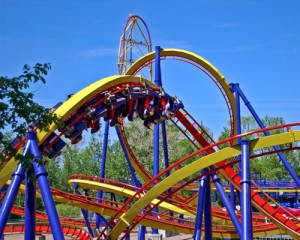The financial markets have been quite tumultuous lately, both in the U.S. and abroad. There have been wild swings in the Dow Jones Industrial Average, with it moving in a trading range of 800 – 900 points in a day. This is unprecedented. It is easy to get caught up in the all financial prognostications of gloom and doom. Negative news always seems to get more attention than the positive news. And as a society, there’s a tendency to focus on what isn’t working, rather than what is.
Having watched the financial markets for about two decades, I still had to take pause as well when I witnessed the roller coaster ride that the markets were taking last week. And it was interesting to see that the only thing more volatile than the market last week was investors’ sentiments. People wanted to rush to “get out of the market”. They were worried about the safety of their money at the bank, if their financial portfolios would ever recover, and if they would be able to retire as planned.
Granted that it takes great resolution to stay focused during these times. We’ve worked hard to earn money and it’s so easy to panic when we see the value drastically decline in a matter of days and to see it steadily decrease over time. This anxiety that we feel about the stock market can easily transfer to other arenas of our lives. We are worried about the stock market, and then we store this tension and release it unexpectedly as bouts of anger or frustration or do into deep depression and despair. None of these, of course, helps our portfolio.
It’s important to remember that the Dow Jones, which is most reported index in financial news, is comprised of only 30 stocks. These 30 stocks are said to be representative of their industries, but they are still just 30 stocks. And since they are actively traded, and widely held, they are likely to be volatile anyways since so many people have ownership in them. A broader classification is to see what the S&P 500 index is doing. The S&P is comprised of 500 stocks, and can paint a much broader picture of the stock market.
 This financial upheaval provides us with an opportunity to re-evaluate our investment goals, to really test our risk tolerance, and to pay better attention to how we allocate our financial resources. Prepare both short and long-term goals. Have money set aside for financial emergencies. Contribute regularly to a retirement plan. One way is to have money deducted monthly from a bank account, so that you can “dollar cost average” the price that you pay for a mutual fund. If you need assistance with preparing or reviewing your financial goals, consult a financial advisor.
This financial upheaval provides us with an opportunity to re-evaluate our investment goals, to really test our risk tolerance, and to pay better attention to how we allocate our financial resources. Prepare both short and long-term goals. Have money set aside for financial emergencies. Contribute regularly to a retirement plan. One way is to have money deducted monthly from a bank account, so that you can “dollar cost average” the price that you pay for a mutual fund. If you need assistance with preparing or reviewing your financial goals, consult a financial advisor.
A diversified portfolio is very important in any market. Being too heavily weighted in any industry or in any stock or fund is risky. One should also have their money spread between stocks, bonds, cds, mutual funds, and money markets. Some are even investing in heavy metals lately. This is best done through purchasing gold or silver coins, rather than the commodities market. The commodities market is considerably more volatile than the stock market. The percentage that goes into each category will depend on how soon you will need the money and your risk/return profile.
If you are not well-equipped to handle your investment strategies, consider having a professional money manager handle your money if you are not able to watch it on a regular basis. Managed accounts start at $50,000. Another way to get professional money management is through mutual funds, where you can usually buy in for $100, if you agree to a monthly contribution. Here you get a diversified portfolio of stocks and / or bonds and there are money managers who regularly re-allocate the portfolio. All investors participate in the dividends, gains and losses.
Remember that the stock market has historically outperformed every other investment vehicle over the years. While past performance is no guarantee of future return, we have witnessed how quickly the stock market can rise when investors regain their confidence. Many see a down market as a great buying opportunity, knowing that what goes down must go back up again.
The next time that the market goes on a wild ride, make sure you board a different train. Ride the peace train.